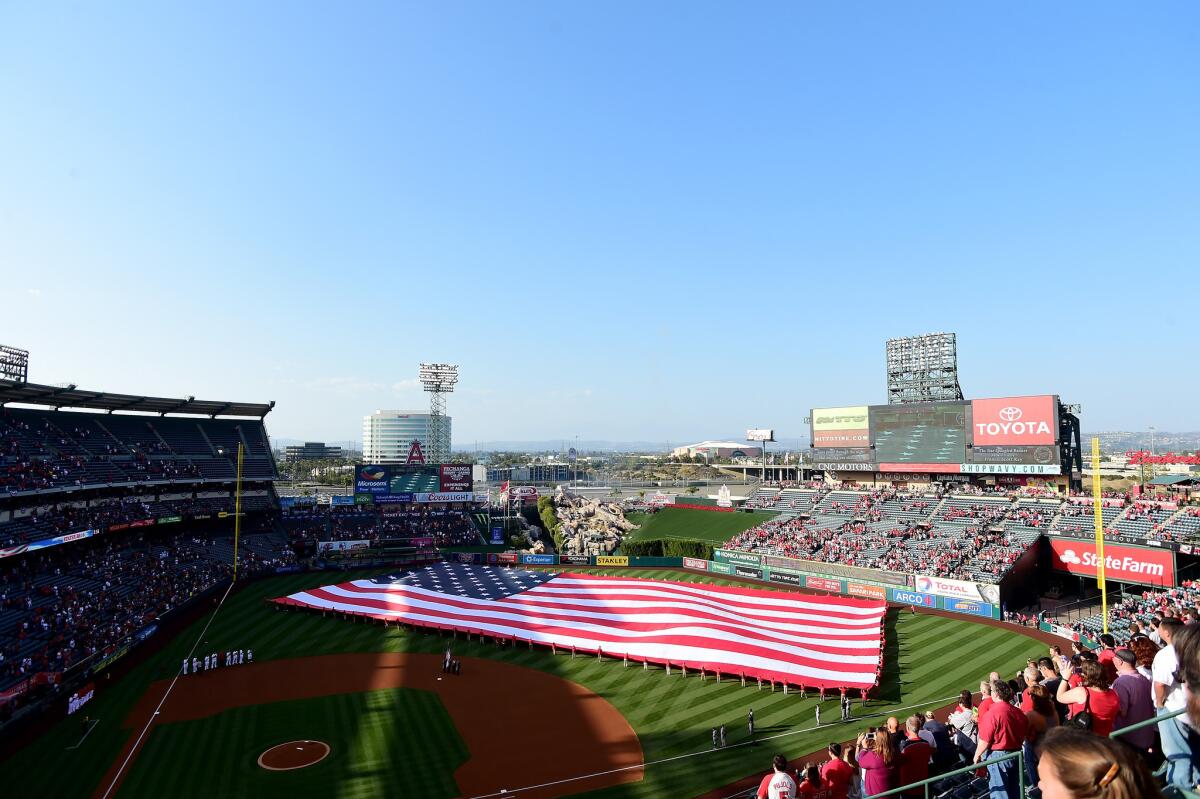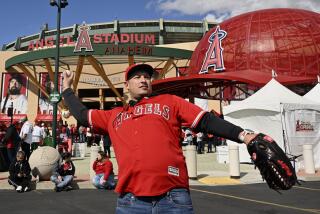Move into a new stadium? Renovate the old one? Angels could just play out their lease in Anaheim

After more than three years of debating whether to negotiate a new lease in Anaheim or move to a new ballpark elsewhere, the Angels might do neither.
The Angels might simply play out their current lease in Anaheim, team President John Carpino said Tuesday. If they do, they would be bound to Angel Stadium through 2029.
Carpino spoke after the developer of a large-scale project next to Angel Stadium agreed Tuesday to postpone an Anaheim City Council vote on the project for three weeks, in the hope of resolving the team’s objections to the development.
In August, the city’s Planning Commission unanimously recommended approval of a 15-acre complex of shops, restaurants, offices, residences and a hotel on the site next to Angel Stadium. The Angels said the city had not adequately considered how traffic, parking, noise and air quality in the area would be affected by a project the team likened to LA Live.
Before the City Council could consider the project — and with the implicit threat of the Angels taking legal action to delay it — the developer said it “volunteered” to table the issue until the council’s next meeting Oct. 18.
“They’ve expressed some concern with certain game-day impacts and we’re happy to work toward mutually agreeable solutions during the next few weeks,” said Steve Greyshock, spokesman for Hong Kong-based developer LT Global.
“It gives us time to get our arms around the entire LT proposal — the impacts, and the fan experience at the stadium,” Carpino said.
Although a team attorney told the Planning Commission last month that the project could “fundamentally undermine the Angels’ negotiations to remain in Anaheim over the long term,” Carpino said Tuesday that the team was “not opposed to the project.” At this point, he said, the Angels want to understand how the development might affect their operations before making a decision on the stadium issue.
The Angels resumed talks on a new lease with Anaheim this year, after negotiations to build a new ballpark in Tustin were unsuccessful. Although the Angels’ current lease extends through 2029, the team can opt out no later than Oct. 16, 2018, which would terminate the lease after the 2019 season.
Carpino said the Angels have three options: move, renovate Angel Stadium, or play out the current lease. The Angels have emphasized the first two options, although it would be challenging for the team to identify a new site, finance a ballpark and build it within three years. The Atlanta Braves are moving to suburban Cobb County next season, three and a half years after announcing an agreement for a new — and largely taxpayer-funded — ballpark.
Angels owner Arte Moreno declined to pay the entire cost of a new ballpark in Tustin, and cities in California are increasingly resistant to using taxpayer dollars to fund sports venues.
Angel Stadium, which opened in 1966, is the fourth-oldest stadium in the major leagues, behind Fenway Park (1912), Wrigley Field (1914) and Dodger Stadium (1962).
With Anaheim ruling out payment of the estimated $130 million to $150 million in infrastructure improvements necessary to maintain Angel Stadium for several more decades, the city had proposed letting the team develop part of the parking lot, then using the profits to recoup the cost of stadium renovations.
Moreno walked away from those talks in 2014, after more than a year of debate over how much the Angels should pay for the land they would develop, and how much the city should share in any profits. The Angels had considered shops, restaurants and a hotel as possible elements in their development, and they have expressed concern that an LT Global project that includes those elements could jeopardize the viability of the team’s development.
The land on which the Angels would build has remained undeveloped in the 50 years since the stadium opened, so the city has received no tax revenue from that land. However, LT Global promises the city at least $5 million per year in tax revenue from its project.
If the renewed talks between the team and the city do not produce an agreement and the Angels decide to play out their lease, it is unclear how the Angel Stadium infrastructure improvements would be funded.
Twitter: @BillShaikin
More to Read
Go beyond the scoreboard
Get the latest on L.A.'s teams in the daily Sports Report newsletter.
You may occasionally receive promotional content from the Los Angeles Times.







